内蒙古鄂尔多斯市达拉特旗九年级英语下册 Module 3 Life now and then Uni
- 格式:doc
- 大小:56.02 KB
- 文档页数:2

Module 3 Life then and nowUnit 1 They sometimes work harder.本模块以“Life then and now”为话题,以学习谈论今夕生活的巨大对别,介绍了中国在改革开放以来社会经济的长足进步。
通过模块学习,学生将重点掌握比较级和最高级的用法和注意事项,并学会在语言运用中使用比较级和最高级。
A. 单词和短语:wealthy, fear, used to, wealth, double, seldom, spare, spare time, speak up, deaf, tiny, electric, light, candle, postman, cold, heat, fulltime, role, education, transportB. 比较级和最高级的使用。
【能力目标】1. Listening for specific information; taking notes.2. Expressing views and opinions.3. Predicting; reading for main ideas; summarizing main ideas in notes.4. Writing a position about the advantages and disadvantages of life today. 【情感目标】Build up students’ patriotism.【教学重点】The parative and superlative forms and usages of adjectives and adverbs.【教学难点】How to pare two phenomena.2.教具学具:光盘、大卡片等。
1.Teach the new words and phrases in the lesson with the Chinese explanation and exact pronunciation.2.Show the Chinese meanings to let student answer English correspondents.3.Show pictures related to the difficult words and phrases to facilitate students’ perception.4.Encourage students to make up English sentences with the new learned words.5.Sum up the new words, phrases and sentence patterns.I suppose that’s because more people have cars…But people don’t take as much exercise as they used to.Some people think life in the past was simpler and healthier than today.Step2. Learning1.Show photos indicating the vast contrast between the previous life and the present life. Let students try to use their own words to describe this change in various aspects including fashion, house, transportation, and lifestyle.2. Let students write down the differences in their own words and highlight the relative sentences in the texts. Teachers summarize the life change.3. Talk about the photo. Say what life was like in the early 1980s and what life is like today.4. At first, students listen to the conversation carefully and then, read the conversation in the form of roleplay.5. Teacher pays attention to the important and difficult parts in the conversation, explaining them to students.Step3. Language points1. finished 是形容词,表示“完成了的,结束了的”。

Module3 Unit 1学习目标知识目标:能熟练使用下列词汇和短语 fear,nearly,in the past,wealth, wealthy,used to do sth. seldom, double, spare time, speak up, the number of, speak up,simple能力目标:1.To understand the conversations about comparing life in the past and now.2. To be able to use comparative degree and superlative degree correctly .学习重点掌握本模块重点词汇并能自如地比较现在和过去的生活。
学习难点To learn how to make comparisons.学习过程Step 1. Lead-i nStep2.Read and answer教师导学学生活动设计1.Is life today better than it was in the past?2.How do you know it?But there are some problems:1.________________________________________________ __________________________________________________2.________________________________________________ _______________________________________________3.________________________________________________ __________________________________________________ Step3.Read and choose correct answer1. People li ve longer today because ___.a) we know more about medicineb) they do not work as hard as they didc) they take more exercise2. There is l ess fear of getting ill ____.a) so people live longerb) b ecause people know how to dea l with the ordinary diseasesc) so people work harder than before3. People take less exercise because ____.a) they do not need tob) they drive cars insteadc) they do not have cars or bikes4. People work harder today and _____.a) they do not live as long as they didb) they do not usually have enough free timec) they live a healthier lifeStep 4. SummaryStep5. Read aloudStep6. DebateDo you think that life is better today than in the past?Step6. Exercisesdeaf doubled fear spare used to wealth1. What kinds of things do you ______?2. What do you do in your ______ time?3. What can someone not do if they are _________?4. If something is __________, is it more or less?5. Do you think people _______ take more exercise than they do today?6. Do you think people have more __________ today than they used to?Step7. Summary重点词句整理(参看学生导学案上的单词卡片)。
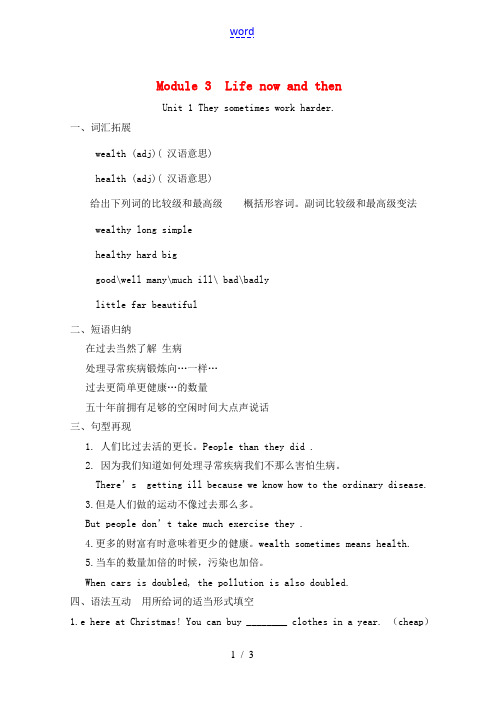
Module 3 Life now and thenUnit 1 They sometimes work harder.一、词汇拓展wealth (adj)( 汉语意思)health (adj)( 汉语意思)给出下列词的比较级和最高级概括形容词。
副词比较级和最高级变法wealthy long simplehealthy hard biggood\well many\much ill\ bad\badlylittle far beautiful二、短语归纳在过去当然了解生病处理寻常疾病锻炼向…一样…过去更简单更健康…的数量五十年前拥有足够的空闲时间大点声说话三、句型再现1. 人们比过去活的更长。
People than they did .2. 因为我们知道如何处理寻常疾病我们不那么害怕生病。
There’s getting ill because we know how to the ordinary disease.3.但是人们做的运动不像过去那么多。
But people don’t take much exercise they .4.更多的财富有时意味着更少的健康。
wealth sometimes means health.5.当车的数量加倍的时候,污染也加倍。
When cars is doubled, the pollution is also doubled.四、语法互动用所给词的适当形式填空1.e here at Christmas! You can buy ________ clothes in a year. (cheap)2.The story is________ and all of us are________in it. (interest)3.Emma looked after her pet dog ________ of all her friends.( careful)4.—Is your headache getting ________?(well)—No, it's worse.5.The cakes taste ________,and they sell ________. I will buy some.(good) 6.The more you smile, the ________(happy) you'll feel.7.Jim gets to school ________(early) than his classmates.8.The Yellow River is the second ________(long) river in China. 9.—Does Jim run as ________(slow) as David? —Yes, but Mike runs _____________(slow) than them.10.It gets________ and ________ when spring es.(warm)五、能力提升A king was old and he knew it was time to choose a new king. He toldall the young people in his country, “I will give ___36___ of you a seed (种子). Plant it and bring it back one year later. Show me the plants that you bring, ___37___ I’ll choose a new king from you.”A boy ____38____ Peter got a seed, too. He planted it ___39___. But the seed didn’t grow at all. A year later, Peter had to take his ___40___ box to the palace. Others all brought beautiful plants there and Peter felt ___41___.The king ___42___ the palace and looked around. When he found there was nothing in Peter’s box, the king smiled and said to the others, “One year ago, I gave every one a seed ___43___ couldn’t grow. But allof you, ___44___ Peter, have brought me plants and flowers. Peter was the only one with the honesty (诚实) and courage to bring ___45___ abox. So he will be the new king!”36. A. neither B. each C. both37. A. but B. although C. and38. A. helped B. asked C. named39. A. carefully B. careful C. careless40. A. full B. empty C. beautiful41. A. excited B. sad C. happy42. A. reached B. got C. arrived43. A. who B. what C. which44. A. besides B. except C. with45. A. such B. so C. as。
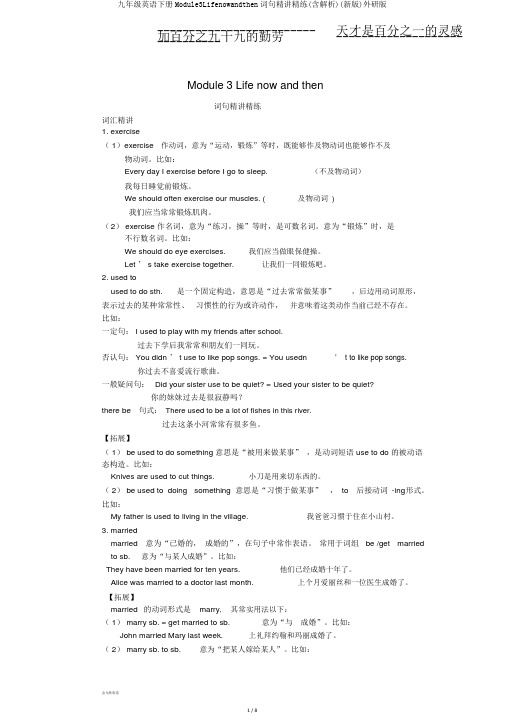
------------------------- 天才是百分之一的灵感加百分之九十九的勤劳------------------------------Module 3 Life now and then词句精讲精练词汇精讲1. exercise( 1)exercise作动词,意为“运动,锻炼”等时,既能够作及物动词也能够作不及物动词。
比如:Every day I exercise before I go to sleep.(不及物动词)我每日睡觉前锻炼。
We should often exercise our muscles. (及物动词)我们应当常常锻炼肌肉。
(2) exercise 作名词,意为“练习,操”等时,是可数名词。
意为“锻炼”时,是不行数名词。
比如:We should do eye exercises.我们应当做眼保健操。
Let ’ s take exercise together.让我们一同锻炼吧。
2. used toused to do sth.是一个固定构造,意思是“过去常常做某事”,后边用动词原形,表示过去的某种常常性、习惯性的行为或许动作,并意味着这类动作当前已经不存在。
比如:一定句: I used to play with my friends after school.过去下学后我常常和朋友们一同玩。
否认句: You didn ’ t use to like pop songs. = You usedn’ t to like pop songs.你过去不喜爱流行歌曲。
一般疑问句:Did your sister use to be quiet? = Used your sister to be quiet?你的妹妹过去是很寂静吗?there be句式:There used to be a lot of fishes in this river.过去这条小河常常有很多鱼。

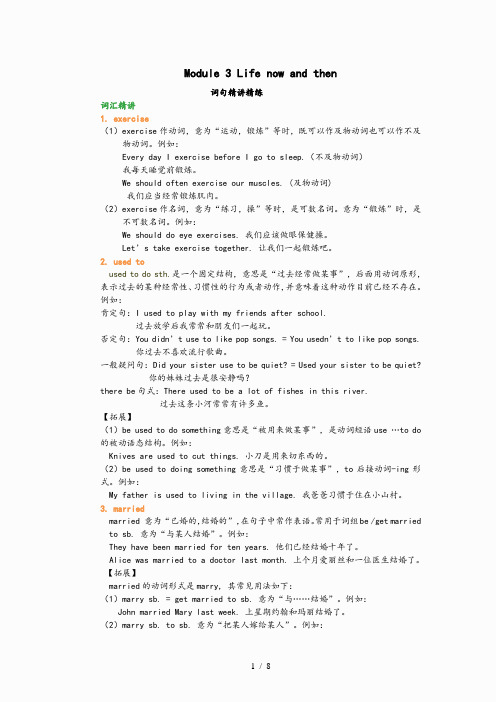
Module 3 Life now and then词句精讲精练词汇精讲1. exercise(1)exercise作动词,意为“运动,锻炼”等时,既可以作及物动词也可以作不及物动词。
例如:Every day I exercise before I go to sleep.(不及物动词)我每天睡觉前锻炼。
We should often exercise our muscles. (及物动词)我们应当经常锻炼肌肉。
(2)exercise作名词,意为“练习,操”等时,是可数名词。
意为“锻炼”时,是不可数名词。
例如:We should do eye exercises. 我们应该做眼保健操。
Let’s take exercise together. 让我们一起锻炼吧。
2. used toused to do sth.是一个固定结构,意思是“过去经常做某事”,后面用动词原形,表示过去的某种经常性、习惯性的行为或者动作,并意味着这种动作目前已经不存在。
例如:肯定句:I used to play with my friends after school.过去放学后我常常和朋友们一起玩。
否定句:You didn’t use to like pop songs. = You usedn’t to like pop songs.你过去不喜欢流行歌曲。
一般疑问句:Did your sister use to be quiet? = Used your sister to be quiet?你的妹妹过去是很安静吗?there be句式:There used to be a lot of fishes in this river.过去这条小河常常有许多鱼。
【拓展】(1)be used to do something意思是“被用来做某事”,是动词短语use …to do的被动语态结构。
例如:Knives are used to cut things. 小刀是用来切东西的。
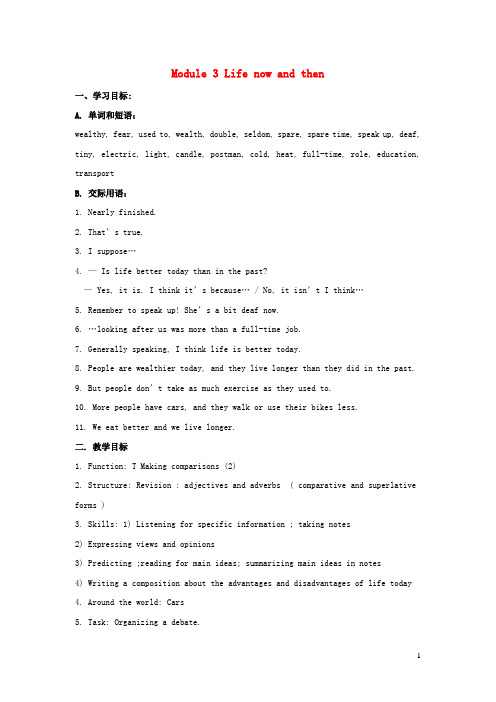
Module 3 Life now and then一、学习目标:A. 单词和短语:wealthy, fear, used to, wealth, double, seldom, spare, spare time, speak up, deaf, tiny, electric, light, candle, postman, cold, heat, full-time, role, education, transportB. 交际用语:1. Nearly finished.2. That’s true.3. I suppose…4. — Is life better today than in the past?—Yes, it is. I think it’s because… / No, it isn’t I think…5. Remember to speak up! She’s a bit deaf now.6. …looking after us was more than a full-time job.7. Generally speaking, I think life is better today.8. People are wealthier today, and they live longer than they did in the past.9. But people don’t take as much exercise as they used to.10. More people have cars, and they walk or use their bikes less.11. We eat better and we live longer.二. 教学目标1. Function: T Making comparisons (2)2. Structure: Revision : adjectives and adverbs ( comparative and superlative forms )3. Skills: 1) Listening for specific information ; taking notes2) Expressing views and opinions3) Predicting ;reading for main ideas; summarizing main ideas in notes4) Writing a composition about the advantages and disadvantages of life today4. Around the world: Cars5. Task: Organizing a debate.三、重点及难点:Grammar: Revision : adjectives and adverbs ( comparative and superlative forms ) 四、教学设计:Unit 1 They sometimes work harder.Ⅰ Teaching modelListening and speakingⅡ Teaching methodCommunicative and interactiveⅢ Teaching aims1. To understand conversations of comparing life in the past and now2. To understand comparative degree and superlative degree3. To learn how to make comparisonsⅣ Teaching Objectives1. Key vocabulary: wealthy, fear, used to, wealth, double, seldom, spare, spare time,speak up, deaf,2. Key structures: Sentence structureⅤ Teaching aidsTape recorder, OHP , videoⅥ Teaching StepsStep 1 Warming up1. Show some pictures to talk.1) Say what life was like in the early 1980s.2) Say what life is like today.2. Introduce new words and expressions.Step 2 Listening practice.1. Ask the students to read through the questions in Activity2.1) What is the history homework?2) What is the question they need to answer?3) What does Betty ask?4) What does Daming ask?2. Play the tape and ask the students to listen to the tape carefully3. Listen and answer the questions.4. Ask the students to check their answer with a partner.5. Call back the answers from the whole class and check the answers. Keys: Write about life in the past and life today.Is life today better than it was in the past?Betty asks if they can write about medicine and pollution.Daming asks if they can write about personal safety.Step 3 Listen and read.1. Ask the students to listen and read the conversation silently.2. Talk about the pictures.3. Everyday EnglishNearly finished.That’s true.I suppose…4. Now choose the correct answer.1. People live longer because ________.a) we know more about medicineb) they do not work as hard as they didc) they take more exercise2. There is less fear of getting ill ________.a) so people live longerb) because people know how to deal with the ordinary diseasesc) so people work harder than before3. People take less exercise because ________.a) they do not need tob) they drive cars insteadc) they do not have cars or bikes4. People work harder today and ________.a) they do not live as long as they didb) they do not usually have enough free timec) they live a healthier life4. Ask the students to check their answer with a partner.5. Call back the answers from the whole class and check the answers.Keys: 1. a 2. b 3. b 4. bStep 4 Complete the questions.1. Ask the students to read through the words and expression in the box in Activity 4.deaf doubled fear spare used to wealth2. Complete the questions with the words or expression in the box.1) What kinds of things do you _________?2) What do you do in your _________ time?3) What can someone not do if they are ________?4) If something is _________, is it more or less?5) Do you think people _________ take more exercise than they do today?6) Do you think people have more ________ today than they used to?3. Ask the students to check their answer with a partner.4. Call back the answers from the whole class and check the answers.Keys: 1. fear 2. spare 3. deaf 4. doubled 5. used to 6. wealth5. Now work in pairs. Ask and answer.Step 5 Pronunciation and speaking.1. Play the recording once without stopping.2. Play the recording again and ask the whole class to repeat.3. Read and predict which words the speaker is likely to stress.Some people think life in the past was simpler and healthier than today. More wealth sometimes means less health. When the number of cars is doubled, the pollution is also doubled, or even worse.4. Now listen and check.5. Read the paragraph in Activity 5 aloud.Step 6 Work in pairs.1. Answer the question and give your reasons.— Is life better today than in the past?—Yes, it is. I think it’s because… / No, it isn’t I think…2. Now say what is better or worse in:education environment healthStep 7 Language points1. Remember to speak up! She’s a bit deaf now.记得说话大点儿声,她现在有点儿耳背了。

九年级下册Module 3 Life now and thenUnit 1 They sometimes work harder.Step1.Listening (小听力)1. People live longer today because ______.a) we know more about medicineb) they do not work as hard as they didc) they take more exercise2. There is less fear of getting ill ______.a) so people live longerb) because people know how to deal withc) so people work harder than before3. People take less exercise because ______.a) they do not need tob) they drive cars insteadc) they do not have cars or bikes4. People work harder today and ______.a) they do not live as long as they didb) they do not usually have enough free timec) they live a healthierStep2. Reading1. What are the advantages about life now compared with life in the past?2. What are the disadvantages about life now compared with life in the past?九年级下册Module 3 Life now and thenUnit 1 They sometimes work harder.句型再现1.Do you think that life is better today than in the past?2.People are wealthier today, and they live longer than they did in the past.3.We know more about medicine today, and there’s less fear of getting ill because we know how to deal with the ordinary disease.4.I suppose that’s because more people have cars, and they walk or use their bikes less.5.When the number of cars is doubled, the pollution is also doubled, or even worse.6.People seldom say they have enough spare time!8. Remember to speak up!堂堂清一、用所给词或短语的适当形式填空。
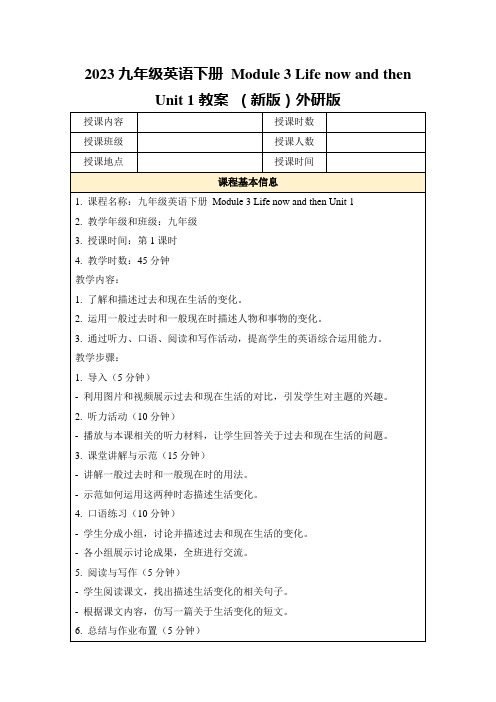
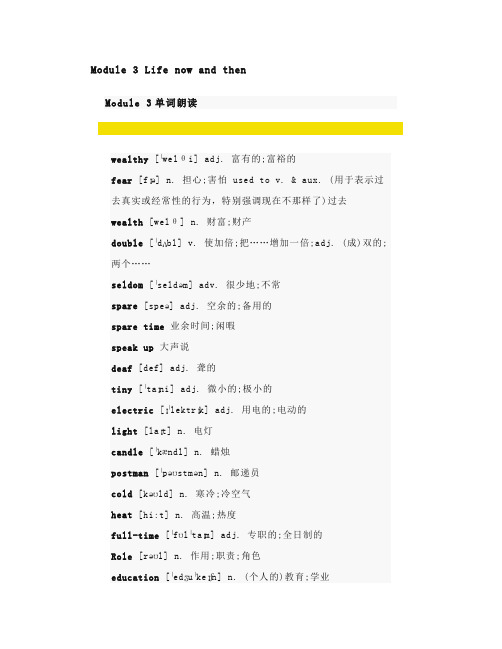
Module 3 Life now and thenModule 3单词朗读wealthy [ˈwelθi] adj. 富有的;富裕的fear [fɪə] n. 担心;害怕 used to v. & aux. (用于表示过去真实或经常性的行为,特别强调现在不那样了)过去wealth[welθ] n. 财富;财产double [ˈdʌbl] v. 使加倍;把……增加一倍;adj. (成)双的;两个……seldom [ˈseldəm] adv. 很少地;不常spare [speə] adj. 空余的;备用的spare time 业余时间;闲暇speak up 大声说deaf [def] adj. 聋的tiny [ˈtaɪni] adj. 微小的;极小的electric [ɪˈlektrɪk] adj. 用电的;电动的light [laɪt] n. 电灯candle [ˈkændl] n. 蜡烛postman [ˈpəʊstmən] n. 邮递员cold [kəʊld] n. 寒冷;冷空气heat [hi:t] n. 高温;热度full-time [ˈfʊlˈtaɪm] adj. 专职的;全日制的Role [rəʊl] n. 作用;职责;角色education [ˈedʒuˈkeɪʃn] n. (个人的)教育;学业transport [ˈtrænspɔ:t] n. 运输业;交通Unit 1 课文(录音+动画+翻译)Mum:It\\\\\'s getting late, Betty. How is your homework?妈妈:越来越晚了,贝蒂。
你的作业做得怎么样了?Betty:Nearly finished.Mum, do you think that life is better today than in the past?贝蒂:快完了!妈妈,您认为现在的生活比过去好吗?Mum:Yes, of course, I do.妈妈:当然了。
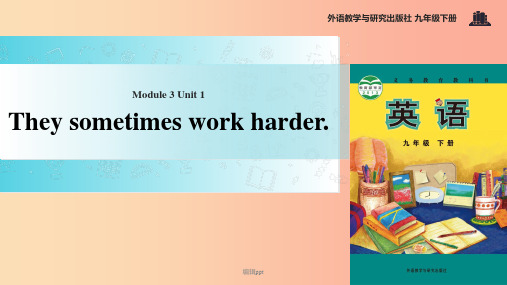

Unit 3 Language in use
科目英语课型新授年(班)级九班级一.复习短语:Unit1
1.需要做某事______________
2.差不多完成了_____________________
3.在过去_________________
4.当然____________________
5.对于患病的担心少了______________________
6.处理____________________
7.普通的疾病_______________________8.和……一样________________
9.过去________________10.我认为_____________________
11.那是因为_____________________12…….的数目或数量______________
13…….怎么样?_______________________14.业余时间________________
15.为什么不……呢?___________________16.记得去做某事______________
17.大点声说________________18.一点___________________________
Unit2
1.现在和过去的生活______________
2.一辈子;一生_____________________
3.在一个很小的房子里________________
4.电灯____________________
5.严寒______________________
6.酷暑____________________
7.出去工作_______________________8.照顾;照看________________
9.不只是;多于________________10.一份全职工作_____________________
11.而且_____________________12女性的角色______________
13结婚;已婚_____________________14.忙着做某事________________
15.步行___________________16.喜欢做某事______________
17. 一般而言,总的来说___________________
二.课堂活动 :
I.语法知识总结:(略)
II.完成课本中的习题。
三.当堂检测:
I.用括号中所给单词的适当形式填空。
1. The more careful you are, _______ (few) mistakes you may ma ke.
2. Her husband was not as _________ (friend) to them as her parents.
3. Maths is one of _________ (important) subject s.
4. If you want to keep fit, you’d better ea t more vegetables and ______ (little) meat.
5. The population of Tianjin is _______ (small) than that of Beijing.
II.单项选择
( )1.The experiment was ______ easier than we had expected.
A. more
B. much more
C. much
( )2. Since China has been a member of WTO, English is ______ useful than before.
A. more
B. most
C. much
( )3. Wei Hua runs ______ than Li Fang.
A.more slowlier
B.much slowly
C.much more sl owly
( )4.The weather in China is different from ________.
A.one in America
B. that in America
C.those in America
( )5.Can you tell me which season do you like ____?
A. well
B. better
C. best
四.请根据下表所列的内容要点以Changes in my hometown为题目, 用英语写一篇短文。
过去 1. 生活贫困,房屋破旧;
2. 污染严重,垃圾遍地;
3. 交通不便,游客稀少。
现在 1. 住房宽敞、明亮, 许多人有私家车;
2. 山更绿, 水更清, 天更蓝;
3. 每年有成千上万来自世界各地的游客。
提示词: convenient 便利的
要求:
1. 短文须包括所有内容要点, 可适当发挥, 使短文连贯、通顺;
2. 80词左右, 开头已给出, 不计入总词数。
Changes in my hometown in the past, my hometown was very small.
五.课后反思:
安全提示。
回家的路上注意安全。